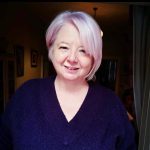A journey to the academic–industry interface with Elaine Harris

 Elaine Harris is a Lecturer and Program Chair for the MSc in Pharmaceutical Quality Assurance and Regulation at the Technical University Dublin (TU Dublin; Ireland) following a 20-year career in the pharmaceutical industry. Here, she speaks about working at the interface of industry and academia, the value of diverse mentor networks and provides some poetic advice to her younger self.
Elaine Harris is a Lecturer and Program Chair for the MSc in Pharmaceutical Quality Assurance and Regulation at the Technical University Dublin (TU Dublin; Ireland) following a 20-year career in the pharmaceutical industry. Here, she speaks about working at the interface of industry and academia, the value of diverse mentor networks and provides some poetic advice to her younger self.
Please tell us your career story
Initially, I chose my BSc degree in Applied Sciences because I always knew I wanted to work in industry, and I joined a pharmaceutical company as a formulation scientist straight from my PhD. I spent almost a decade working in various roles in the industry before opting to become a consultant working at the academic–industry interface.
As a result, I have spent the past decade working with a number of universities and funding agencies, looking at the best way to commercialize early-stage pharmaceutical and med-tech research. About 3 years ago I came back to academia and have found a happy home at this academic–commercialization interface, with a focus on enabling researchers to adopt appropriate regulatory strategies.
What is a typical day in your life?
A typical day is divided between lecturing, my Program Chair duties and supervision of MSc and PhD students. Finding a balance between all the competing tasks can be quite challenging but I think the trick is to be sure about the non-negotiables, for instance, guaranteeing the time to prepare lectures, taking meetings with research students, and being flexible with all the other urgent but not really that important tasks that can swamp your day. I’ve never yet managed to fully complete my ‘to-do’ list and I try to make peace with this.
How have you found mentors throughout your career? What have you gained from these relationships?
I was lucky that in my first role in industry I was at a company that fostered working collaboratively in very multi-disciplinary teams. You had the opportunity to work with people with a wide variety of backgrounds and expertise and learn from them.
The cross functional nature of the teams, covering early-stage research, preclinical, formulation, analytical, quality and finance, meant that you gained a holistic view of what it took for early-stage research to succeed at preclinical and early clinical phases. It also gave you the opportunity to be mentored by people with different expertise. I’ve carried this experience with me throughout my career and still have that network of ex-colleagues that I can rely on for advice and mentoring even to today.
How do you balance work with your other passions and commitments?
I think this is one of the biggest challenges you can face. Balancing work and family commitments is always going to be difficult but having supportive people both in work and at home makes it a lot easier. I try to think back to when I had two children under two while working full time and always wonder how on earth I ever slept. But I must have done, and those two children are grown men now, so they survived it and so did I!
Now that my children are older it’s great to find time outside work for other passions too and I’m back studying part-time for a degree in an entirely different field: archaeology! I’m having to juggle work and study and am loving it!
What resources/networks have you found useful in your career, particularly as a woman in science?
I think the best network I have is the one from my first company, there really isn’t anyone I worked with then (now over 20 years ago) that I couldn’t still call and ask for advice or a favor from. I still count some of them as very close friends and feel lucky that this is the case. When I was younger, I was also involved in WITS (Women in Technology and Science) and this provided fantastic networking opportunities.
What are you most proud of in your career?
I’m probably most proud of how I’ve moved and adapted from starting out as a bio-inorganic chemist PhD to finding my place in the pharmaceutical/med-tech sector and how I now try and help academics translate their research into patient-centric products.
What are you most excited about in the years to come, especially around women in science?
I’m very lucky to be the Program Chair of an MSc program at TU Dublin and this gives me the chance to meet cohorts of young scientists every year at the very beginning of their careers. The women in the program impress me so much with their vision, passion and determination. Every year, I look forward to seeing them graduate and head off into their careers as quality professionals.
What are the best and most challenging aspects of your job?
Watching our students graduate and move into their careers is wonderful, I love when I hear back from these students as they progress in their fields and particularly when they come back and speak with our current students and advise them. The most challenging part of academic life, after a career in industry, is trying to adapt to funding constraints and timelines.
Are there any women that you have met in your career or look up to that you would like to give a mention to?
The best manager I had was one that was both supportive and challenged me in equal measure. She was someone I could always go to for advice and even though we haven’t worked together for 20 years, I still value her opinion and ask her for advice!
What advice would you give to your younger self?
I love the quote from Robert Fulghum’s All I Ever Really Needed to Know I Learned in Kindergarten – although maybe forget the nap, during the work week anyway!
Live a balanced life.
Learn some and think some and draw and paint and sing and dance and play and work every day.
Take a nap every afternoon.
Be aware of wonder.